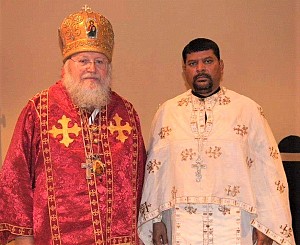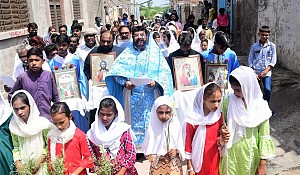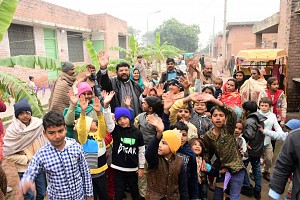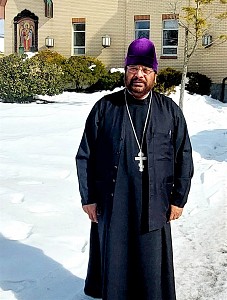The priestly ordination of Fr. Joseph took place in Sri Lanka. Metropolitan Hilarion decided to heed the warning of the local authorities about the danger of Orthodox foreigners staying in the country. At that time, Priest Adrian Augustos traveled to Pakistan from Australia to serve. Pakistan is the second largest Muslim country in the world after Indonesia. Only about 4% of the people there are Christians: half of them are Catholics, the other half are Anglican.
The dean and spiritual mentor of the Pakistani community, Fr. Adrian (before baptism – Vishal Augustos) was born in northern India in the city of Lucknow, and studied at a Catholic school. Disillusioned with Catholicism, he joined the Anglican Church, but did not find a difference between them and began to learn about Orthodoxy on the Internet. He came to Australia and was baptized by the future First Hierarch of ROCOR (2008-2022), Metropolitan Hilarion (Kapral; +2022).
During his first trip to Pakistan, Fr. Adrian baptized 174 people. In Pakistan and on the Internet, he conducted pastoral courses for the newly ordained clergy, and the local clergy, in their turn, led catechism courses for adult parishioners, classes in Sunday school for children. Three local priests have already been ordained for Pakistan. Among them is Priest Joseph Farooq. Recently, he visited the United States.
‒ Is this your first trip to the USA? What is the main aim of your visit?
Father Joseph ‒ Yes. It is very difficult to get a visa to the U.S. but, thank God, with holy prayers of Metropolitan Nicholas, I received the visa.
The main aim of my visit was to meet my ruling bishop and have his blessing for my liturgical experience and translating work. It is a great blessing for me that I met His Eminence, Metropolitan Nicholas, face to face, spoke with him, and had a chance to join him in the services and pray in front of the Kursk Root Icon of the Mother of God "of the Sign."
I also wanted to spend some time in Jordanville. I am alone in Pakistan; I have no other ROCOR priests to experience the living community and share experience with them. So, it was a good chance for me to live in Holy Trinity Monastery in Jordanville among the monks and priests. Also, I wanted to share some of our ROCOR mission’s progress and some of the difficulties we have in Pakistan with Vladyka Nicholas, and I wanted His Eminence to bless our small Center of Adult Education for women named after St. Matrona of Moscow, where we have a Sunday school for children and also a program for women who have no chance to go to school.
‒ Father Joseph, when did you start Orthodox Mission in Pakistan?
‒ The mission actually started in 2008, but officially we were accepted into ROCOR by His Eminence, Metropolitan Hilarion, in 2011. At the end of 2011 and beginning of 2012, he sent Fr. Adrian Augustos to Pakistan from Australia. He visited Pakistan regularly until 2014, preached Holy Orthodoxy, baptized and chrismated people who had been prepared by me. We have 300 Orthodox families, 800-plus Orthodox believers and four mission stations in Pakistan.
Our Orthodox Mission is registered with the government of Pakistan under the name of St. Michael the Archangel, and we have our main parish in the city of Sargodha. Every year, our mission gets a renewal certificate from the government by submitting our papers.
We have a small mission station on Jaranwala Road in Faisalabad, named after St. John of Shanghai & San Francisco. Another small center is also located at Chak No. 101/NB in Sargodha, named after St. Innocent of Moscow. It is within the city but not near our parish. A small station center in Fatehpur, District Layyah, is named after St. Nicholas of Japan. We have selected these great saints because of their missionary work.
‒ Were you already an Orthodox priest at that time?
‒ No, I was a former Roman Catholic priest. Then I drew to Orthodoxy because of my study of the Eastern Orthodox Church Fathers. My curiosity led me to convert to Eastern Orthodoxy, because I clearly saw the difference between the Orthodox Church and Roman Catholicism, and especially the Protestant denominations. My matushka is also helping me with the Mission.
‒ Fr. Joseph, how did your family come to Orthodoxy? And would you kindly introduce your family to our readers?
‒ When I had come to Orthodoxy, Fr. Adrian baptized my wife and children.
My wife Sophia is a schoolteacher. She teaches English in a private school to O level students. Before and after my ordination, I also taught English and social studies at school for almost 15 years.
We have a son and a daughter. Our son’s Christian name is Dimitry, he is 22 years old, and he is studying Medicine at the State University in Uzbekistan. He speaks very good Russian. Before going to Uzbekistan, he studied Russian at the National University of Languages.
Our daughter Maria is 19. She is studying Psychology at the University of Sargodha in Pakistan.
‒ And what about women in Pakistan in general? Many of them are not able to receive a good education, is that right? That is where your St. Matrona of Moscow Center comes in handy…
‒ That’s true. We arrange some reading and some writing classes for adult women. Not only our parishioners, but all Christian women are warmly welcome to come to our center. The purpose of selecting the name of Blessed Mother Matrona is because she was blind and could not read, but God gave her the wisdom and the strength to see everything. So, we pray that God would give the women, who have no chance to go to school and are ill-treated, wisdom, and Blessed Matrona would help them read and write. Every year we have a good number of women in our center. Some women are 30, some are 24, and we also have a young group of girls who are not married ‒ 17-18 or even 15 years old. They communicate with each other, and we especially help them to strengthen their faith.
We have a two-year program for them. They learn catechism and Orthodox prayers, and also they learn stitching and sewing in the Center. After the completion of this program, we give them certificates, so that they can work and earn something for their families. This is good because in Pakistan women are considered inferior; they have no right to marry a person of their liking, and they sometimes are very much depressed. We help them to be steadfast and strong in their faith. Also, we protect our women and give them some sense of security and help them to be aware of their basic human rights.
‒ You serve at the same hall, don’t you?
‒ Correct. I told Vladyka that we want to renovate this hall into a temple. Now we have the curtains for the altar doors, and this time Vladyka blessed me not to use the curtains anymore, but to install doors. When I am back in Pakistan, we will install three doors indoors, and another two doors in the altar for proper Divine Liturgy.
With the blessing of His Eminence, Metropolitan Hilarion, in 2020 we also purchased a small plot of land for the construction of a proper large temple, a parish house, and a children’s school where students would learn Orthodox catechism and traditions of the Orthodox Church.
‒ Fr. Joseph, would you please tell us about the traditions of your parish?
‒ Our Mission has outreach missionary stations. Every time I visit them, we pray and eat together, in the evening we have Vigil or Vespers, and in the morning I celebrate Divine Liturgy. On Saturday and Sunday, I have to come back to the main parish office. Every Sunday, 50 to 60 people come for Divine Liturgy, and people who wish to come for Holy Communion come early in the morning for confession. Some people come in the evening, but in Pakistan most people work and they have no time to come in the evening. On great feast days ‒ for example, the Nativity of Christ, Pascha, or our annual feast of Saint Michael the Archangel – a large congregation of 200-plus, sometimes 300 people come to the service. On October 14, we have a big feast for our congregation – the Protection of the Mother of God, when people from other mission stations come and join us for the feast day.
They come wearing very beautiful and bright clothes, participate in the Liturgy, light candles, pray, and sometimes I see the people crying and weeping because they share their sorrows with the Mother of God and ask the protection of the Most Holy Theotokos. After the divine service, we have fellowship, we eat and sing together. For them it is a time of joy, because in our community people are so busy in their works and engrossed in their family problems and other sufferings. They are so oppressed, and they have no chance for celebrations at home. Feast days are a kind of joy and happiness for them; they also strengthen their faith, and they feel proud that they are Orthodox Christians and they are participating in the feast.
On another great feast day, the feast of the Dormition of the Mother of God on August 28, we have a great procession in the street with the icon of the Dormition. People sing and chant. I bless them with holy water on the feast days, and people are very happy. In ten years, our people got familiar with the holy saints of the Russian Orthodox Church, the Holy New Martyrs, and the Royal Martyrs.
We commemorate all days according to the liturgical calendar. If we have a feast on Friday, then we celebrate it on Sunday, because it is very difficult for people to come on Friday or other working days. When I started the mission, it was very difficult for me, because we were following the old calendar and we had the different dates for the Nativity of Christ and Lenten season. Our congregation, though we were at that time very small, faced suffering not only from other religions, but even from the Christians denominations. They said we were not Christians as they had other feast days, especially Christmas.
‒ How did you start the divine services? I mean, which language did you use in the very beginning?
‒ First, I started using mixed languages. Then, I started translating the services from English into Urdu. I did my first translation in 2013, but it was not proper and had some mistakes. It took me seven years to do a very good translation I presented it to Metropolitan Nicholas and Holy Trinity Monastery. During my work, I consulted some professors in Moscow, some priests and monks in the USA, many dictionaries and reference books. From both Slavonic and English versions, I would choose the most appropriate words and word combinations for proper Urdu translations.
‒ Who sings in your choir?
‒ Mostly a group of young girls from our St. Matrona Center. Our male youth group is also part of the choir.
‒ Fr. Joseph, please tell us about your work as a "social worker."
‒ Many poor Christian families in Pakistan do not send their children to school, especially in the private English Medium Schools. They cannot afford the school fee and buying books. On the other hand, Christians get education, and I encourage parents to send their children to school. Thank God, with the help of the Fund for Assistance to ROCOR, I am paying for the education of 20 students. I do not give money to their parents, but send it directly to school.
‒ Which churches and monasteries did you visit in the United States?
‒ Jordanville was really a good experience for me, because after my ordination it was first time I lived in a community. And especially I had the time with the liturgical practice in the altar.
I spent three weeks in the monastery. I tried my best to celebrate Liturgy in a proper way. Also, I was observing the schedule of the monks. At 4:30 AM, I woke up, then rang the bell. At 5 o’clock, I was in the chapel for Midnight Office, Matins, and Divine Liturgy. Then I had time to visit the bookstore, Russian museum, join the seminary students, sit with the monks and listen to their experience (some monks have lived in the monastery for the last 40 years). They shared their experience about the spiritual life at the monastery. At 4:00 PM we had Vespers, at 8:00 PM – Compline, and then – monastic prayer rule. It was really a very good experience.
I have learned so many new things; for example, the fellowship after Divine Liturgy, the proper reading, how the candles are made. In fact, many new things. And I will tell my people about Orthodoxy in the USA, about how to stand steadfast in the Church no matter where we live.
I asked Metropolitan Nicholas to visit other parishes to raise some funds for the construction of the holy temple on my next visit in the summer. Vladyka was so kind and he blessed me.
Interviewed by Tatiana Veselkina






